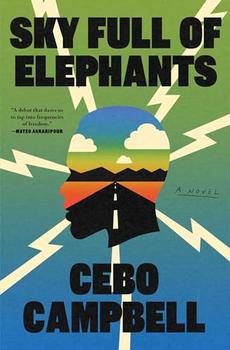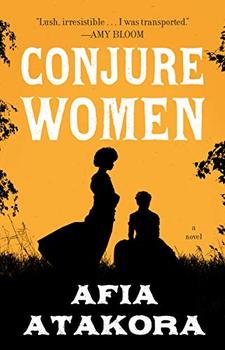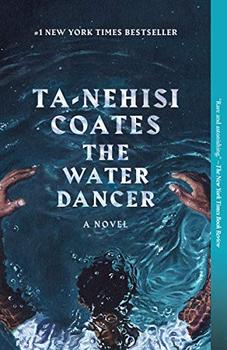Summary | Excerpt | Reading Guide | Reviews | Beyond the book | Read-Alikes | Genres & Themes | Author Bio

A Novel
by Cebo CampbellWhen life changes in an instant, what happens next? More specifically, as Cebo Campbell asks in his debut novel Sky Full of Elephants, when white people of every age and every geographic location, on the same day and at the same time, walk into the nearest body of water and drown, what are we left with? And what exactly are the consequences when half the population is erased? Campbell attempts to answer these stirring questions in a mesmerizing story about loss, gain, and identity.
The focus of the novel is Charlie Brunton, a solar and electrical power professor at Howard University navigating a variety of emotions after "the event." While Charlie is relieved whites are gone, without them, systems have collapsed. Banks are shuttered, the subways are half-filled, paychecks are cash-only. Television is a hybrid form of what it once was. Gas stations have folded. Charlie feels pressure to embrace the new normal even when he often feels numb to it all, unable to celebrate how everything has changed.
During a break between classes one afternoon while he is dozing off on the cot on the floor of his office, the phone rings, interrupting his quiet. He hears a voice say, "I'm Elizabeth's daughter." Elizabeth Waggoneer is of his past, a brief romance that ended in a rape charge. Charlie has never spoken with, seen, or thought much about the daughter Elizabeth gave birth to. "I don't know why I called you," Sidney says. The lone survivor of her white family and anxious to recapture normal, she has little interest in dethawing her relationship with her black father. Desperate to travel from Wisconsin to Alabama, where a colony of whites survived the event and are living in Orange Beach, she is reaching out to Charlie as her only option.
For selfish reasons — wanting to connect with the daughter he has never given himself permission to dream about — Charlie agrees to Sidney's terms and they set out on an adventure that includes driving to Chicago, flying to Mississippi, and borrowing a car; following the easiest route to Alabama, whose airspace is now restricted. Mobile, Alabama is a liminal space, a swath of colors and vibrancy. On every corner, the pulse of the city is simultaneously appealing and strange as the area hums in preparation for a New Orleans-style Mardi Gras. Charlie notices how ordinary the people milling around the shops and restaurants appear, some without a care in the world, some with a brow furrowed, a frown, or blinking eyes. Down a narrow street are townhouses with iron balconies and people drinking and laughing and dancing. These are a different kind of people. Durable. Unable to be shaken from a world that changed with half its population gone. Instead of uncertainty, their faces reflect joy, as if the absence of white people is a prayer finally answered.
Is it believable in a speculative novel that negotiates both racial ambiguity and racial anxiety that Alabama is separated from its past trauma of Jim Crow, George Wallace, and the White Citizens' Council? That segregation-inducing poverty, white nationalism, and lack of opportunities would give way to a black monarchy? In this suspension of disbelief, Campbell has crafted a king and a kingdom that is the antithesis of everything Alabama offers in historical narratives. The king, Hosea, is a thoughtful, kind man with quiet majesty who meets Charlie and instantly sizes him up as someone who is confused. Hosea doesn't know Charlie's backstory or what happened to him after Elizabeth testified and he was sent to prison. If Charlie is confused, he has good reason to be, wrongly convicted in the most stereotypical of ways. A white woman's lie, a black man's suffering.
When Sidney is taken to see the queen, she tells her about Orange Beach and why she needs to get there to reunite with her Aunt Agnes. She wants things to be what they were. The queen replies, "The funny thing about the way things were, child, is that they weren't." She introduces Sidney to her daughter, Nona, one of the most beautiful people Sidney has ever seen. Her dark skin glows, her eyes sparkle. "Nona seemed to exist as her own star." Raised in Wisconsin as the not-quite-white daughter of a white mother, Sidney othered herself, pretending she was not what she was. But in the presence of Nona, close to her age, Sidney's racial identity flowers into a series of lovely vines. She realizes blackness is not a commodity for sale but not to be ignored either. It simply is. And while she still wants to go to Orange Beach, she finds herself exploring what she has denied for most of her life.
The poet Rumi wrote that miracles swell in the invisible, but this isn't a story about miracles. It's about what racial politics fail to address: Who are we beneath the color of our skin? Does black identity feed off the host of white existence? Is it refracted in white light? If white people are gone, what do black people know about themselves? I found the story itself evocative, but the execution is its real triumph. Campbell borders on poetic with his prose; it's simply beautiful to read.
I thought of how drowning, by its very nature of sheer helplessness, an inability to breathe until you just stop breathing, has a way of romanticizing the victims and what they could have done had the water not sucked every ounce of life from them. So, the whites in this story, who are by default imaginary, return as victims of this supernatural event that took their lives. It works somehow, this layering of victims. Charlie who was wrongly incarcerated. Sidney who was left behind by her family. And the passel of dead whites who marched blindly into a lake.
In a college playwriting class, I studied Douglas Turner Ward's mid-sixties Day of Absence, a story about a southern town that wakes up one day with all the black people disappeared. Some sixty years later Cebo Campbell has crafted a reverse think piece that feels existential.
My grandmother used to say, is it loud enough for the ghosts to hear? What she meant was, does it include the ancestors? Though a speculative novel, Sky Full of Elephants twins the past and the present in a father-daughter story of rupture, pain, and identity. It's original and clever and surprisingly contemporary and aspirational. Cars are electric and plane rides are free. Airports the way we know them to be no longer exist. It's exciting to read about a future we can imagine but the real beauty of the story is in its focus on perception. The problem is never the absence of whites but rather the response to their disappearance, the strain their erasure has created, and how we look at ourselves in the new normal.
![]() This review
first ran in the September 18, 2024
issue of BookBrowse Recommends.
This review
first ran in the September 18, 2024
issue of BookBrowse Recommends.

If you liked Sky Full of Elephants, try these:

by Afia Atakora
Published 2021
A mother and daughter with a shared talent for healing - and for the conjuring of curses - are at the heart of this dazzling first novel.

by Ta-Nehisi Coates
Published 2020
In his boldly imagined first novel, Ta-Nehisi Coates, the National Book Award–winning author of Between the World and Me, brings home the most intimate evil of enslavement: the cleaving and separation of families.
Your guide toexceptional books
BookBrowse seeks out and recommends the best in contemporary fiction and nonfiction—books that not only engage and entertain but also deepen our understanding of ourselves and the world around us.